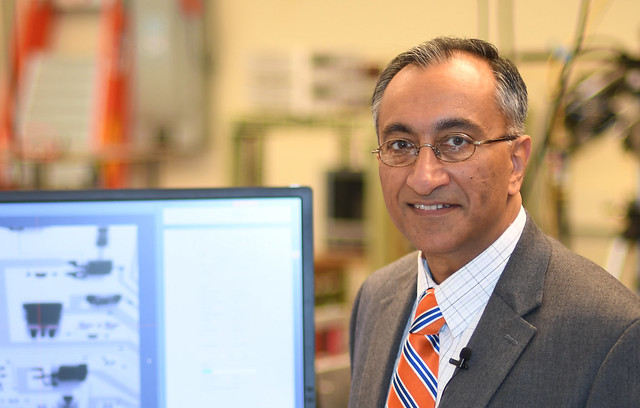Lall receives advisory board's Advancement of Research and Scholarship Achievement Award
Article body
At its recent spring meeting, Auburn University’s Research and Economic Development Advisory Board selected Pradeep Lall, the McFarlane Endowed Professor in Auburn’s Department of Mechanical Engineering, as the 2018 recipient of its Advancement of Research and Scholarship Achievement Award. The award recognizes Lall for his research achievements in the fields of harsh-environment electronics and flexible electronics.
The advisory board is made up of more than 40 industry professionals from across the country who actively support Auburn’s research efforts. The group established the award in 2014 to recognize significant research and scholarly activity that exemplify and advance Auburn’s research and scholarship mission. The recipient of the annual award receives a $25,000 grant to further his or her research.
Lall, director of Auburn’s NSF Center for Advanced Vehicle and Extreme Environment Electronics, is the author or co-author of two books, 14 book chapters and more than 500 journal and conference papers in the field of electronics reliability, safety, energy efficiency, and survivability. He serves on the NextFlex Institute’s technical council and governing council. Lall spearheaded research efforts in flexible electronics and led Auburn’s proposal team for the NextFlex Flexible Hybrid Electronics Manufacturing Institute.
A fellow of the Institute of Electrical and Electronics Engineers, or IEEE, and the American Society of Mechanical Engineers, Lall has received numerous awards for his research. He is the recipient of the IEEE Sustained Outstanding Technical Contributions Award in 2018 and the National Science Foundation Schwarzkopf Award for Technology Innovation in 2016. With significant funding from public-private partnerships, Lall’s work has proven beneficial to the aerospace and automotive industries and in military vehicles and defense systems.
“The Research and Economic Development Advisory Board has made a great choice in honoring Dr. Lall with this award,” said Jennifer Kerpelman, Auburn’s interim vice president for research. “He is a very accomplished researcher with a strong track record, and his work is a great asset to Auburn University,” she added.
Lall’s research focuses on the development of methods for assuring survivability of electronics to high shock forces, vibration and extreme temperatures. He is best known for his research in the areas of reliability and prognostics for electronic systems operating in harsh environments, such as:
- Combined exposure to temperature and vibration under the hood of an automobile for electronics mounted on-engine or on-transmission;
- Extreme cold or extreme hot environmental temperatures for prolonged periods of time experienced in military and defense applications;
- High g-forces experienced by electronics inside missiles;
- Corrosive attack of salt fog for electronics operating on ships at sea.
“Electronic systems have taken an increasingly important role in automotive design and operation,” Lall said. “Traditional automotive electronics at one time consisted of climate control and entertainment systems. Roll the clock forward to the present day, and automotive electronics have expanded to include driving assists such as antilock braking systems, traction control systems, adaptive cruise control, lane departure warning systems and more. Failure of one of these systems is no longer an inconvenience; it may be critical to the safe operation of the vehicle.”
Related Media
Media interested in this story can contact Communications Director Preston Sparks at (334) 844-9999 or preston.sparks@auburn.edu.
Auburn University is a nationally ranked land grant institution recognized for its commitment to world-class scholarship, interdisciplinary research with an elite, top-tier Carnegie R1 classification, life-changing outreach with Carnegie’s Community Engagement designation and an undergraduate education experience second to none. Auburn is home to more than 30,000 students, and its faculty and research partners collaborate to develop and deliver meaningful scholarship, science and technology-based advancements that meet pressing regional, national and global needs. Auburn’s commitment to active student engagement, professional success and public/private partnership drives a growing reputation for outreach and extension that delivers broad economic, health and societal impact.





